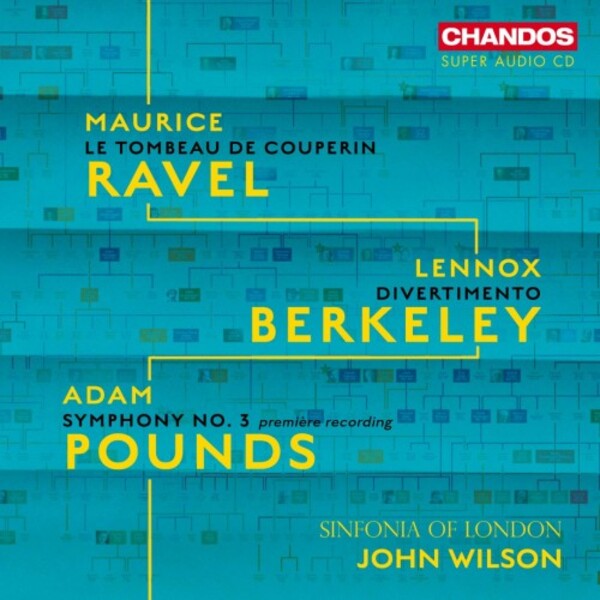BERKELEY; RAVEL; POUNDS Orchestral Works (Wilson)
View record and artist detailsRecord and Artist Details
Genre:
Orchestral
Label: Chandos
Magazine Review Date: 03/2024
Media Format: Super Audio CD
Media Runtime: 66
Mastering:
DDD
Catalogue Number: CHSA5324

Tracks:
| Composition | Artist Credit |
|---|---|
| Divertimento |
Lennox (Randall Francis) Berkeley, Composer
John Wilson, Conductor Sinfonia of London |
| Symphony No 3 |
Adam Pounds, Composer
John Wilson, Conductor Sinfonia of London |
| (Le) Tombeau de Couperin |
Maurice Ravel, Composer
John Wilson, Conductor Sinfonia of London |
Author: Andrew Achenbach
Born in London in 1954, Adam Pounds attended the London College of Music before going on to study privately with Lennox Berkeley from 1976 to 1979. This was my first encounter with his music, its economy of thought, clean-cut craftsmanship and readily assimilable idiom a testament to lessons well learnt under the guidance of his tutor. Pounds’s Third Symphony was composed for John Wilson and the Sinfonia of London between February and May 2021 (an uneasy period of reinstated coronavirus lockdowns and measures). Pay heed to the thematic material presented in the darkly intense introduction, for it is destined to reappear at salient points along the journey. The second movement brings a swirling waltz tune that might easily have come from a ballet by Prokofiev or Khachaturian, while the succeeding Larghetto emerges as a powerfully compassionate threnody to victims of the pandemic, its long-breathed melodic inspiration simultaneously acknowledging the example of Bruckner (to whom the movement pays homage). The finale projects a mood of hard-won defiance, and the symphony as a whole is certainly worth experiencing – especially in a performance as scrupulously prepared and committed as this one.
Pounds’s distinguished mentor is represented by the hugely engaging, pithy and characteristically elegant Divertimento that he completed in the summer of 1943 following a commission instigated by the BBC’s then recently appointed director of music, Arthur Bliss. Cast in four movements and deftly scored for modest forces comprising double woodwind, two horns, two trumpets, trombone, timpani and strings, the work bears a dedication to Berkeley’s teacher Nadia Boulanger. Wilson and his hand-picked group respond with conspicuous finesse and plenty of ebullient sparkle, although a comparison with the composer’s own vintage November 1973 recording with the LPO (superbly balanced by Decca’s Kenneth Wilkinson in Kingsway Hall – Lyrita, 9/75, 3/93) reveals a delectably unforced quality and strength of personality not quite equalled here.
Berkeley in turn enjoyed close ties with Ravel, whose adorable Le tombeau de Couperin again receives a notably secure outing. The Menuet is particularly fine, the orchestral playing evincing lots of heart and supple affection in the deeply poignant musette at its core. Otherwise, there’s a marginal want of beaming spontaneity and stylish flair – attributes possessed in abundance by, say, Thomas Zehetmair’s account with the Orchestre de Chambre de Paris (Naïve, 2/14 – the most rewarding version to have come my way within the past decade or so). An appealing curtain-raiser nonetheless to a sumptuously engineered programme that to my mind merits investigation for the communicative Pounds symphony alone.
Discover the world's largest classical music catalogue with Presto Music.

Gramophone Digital Club
- Digital Edition
- Digital Archive
- Reviews Database
- Full website access
From £8.75 / month
Subscribe
Gramophone Full Club
- Print Edition
- Digital Edition
- Digital Archive
- Reviews Database
- Full website access
From £11.00 / month
Subscribe
If you are a library, university or other organisation that would be interested in an institutional subscription to Gramophone please click here for further information.




